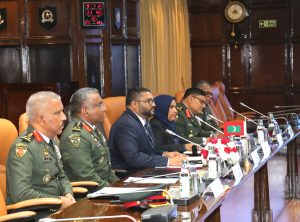A recent Washington Post report alleged an India-backed plot to impeach Maldives President Dr Mohamed Muizzu. However, the Muizzu government’s response to the bombshell exposé has been rather reticent.
According to the Post report, which was published on December 30, in early 2024, Indian intelligence agents plotted with leaders of the main opposition Maldivian Democratic Party (MDP) to impeach newly-elected President Muizzu. The report cited internal documents, surveillance records, and interviews with key Indian and Maldivian sources.
After secret talks with agents working for India’s Research and Analysis Wing (RAW), MDP politicians sought $6 million from India to bribe 40 parliamentarians as well as 10 senior army and police officers and three powerful criminal gangs, according to a RAW document titled “Democratic Renewal Initiative.”
The Indian government ultimately “did not pursue or finance an attempt to oust [Muizzu].” But the aborted plot offered “a rare view into the much broader, often shadowy struggle between India and China for influence over a strategic swath of Asia and its surrounding waters,” the Post observed.
The first response from a Maldivian politician came from former President Mohamed Nasheed. “India would never back such a move, as they always support Maldives’ democracy. India has never dictated terms to us, either,” he tweeted.
Nasheed said he was “unaware of any serious plot against the President.” But “some people always live in conspiracy,” he added.
Government responses came later with peremptory dismissals from both the Indian and Maldivian foreign ministries. Neither side addressed specific instances of alleged Indian interference in Maldivian politics with material support for the MDP.
The Indian External Affairs Ministry questioned the credibility of the American paper and its former award-winning New Delhi bureau chief.
“Both the [Washington Post] and the reporter in question appear to nurse a compulsive hostility towards India. You can see a pattern in their activities,” spokesperson Randhir Jaiswal suggested at a media briefing on January 3, referring to reporting by the same journalist on an alleged assassination program carried out by Indian intelligence in Pakistan.
Underlying the rather tepid response of the Maldivian and Indian governments to the exposé is their ongoing effort to move past their recent adversarial relations to build a more cooperative relationship.
Days after the Post report was published, the Maldives foreign minister and defense minister traveled to India.
During his maiden official visit, Abdulla Khaleel, the new Maldives foreign minister, echoed Jaiswal’s sentiment, casting the Post story as part of efforts to undermine India-Maldives ties.
In an interview with WION on January 4, Khaleel described the claims as “totally something that is untrue, unfounded. There is no truth in that.”
Khaleel’s trip was closely followed by Defense Minister Ghassan Maumoon’s first official visit to India. Talks with his counterpart Rajnath Singh “focused on exploring avenues to further strengthen defense cooperation between both nations,” the Defense Ministry said.
Back in the Maldives, the allegations raised by the Post were widely covered in local media. The MDP leadership remained tightlipped and refused to comment on their alleged Indian patronage. But opposition-aligned outlets highlighted $200,000 bribes allegedly paid to 13 MDP MPs who defected to Muizzu’s People’s National Congress (PNC) in late December 2023.
Government supporters and politicians touted the Post story as vindication of their protests against the alleged outsized Indian influence over the previous MDP government.
But in his WION interview, Foreign Minister Khaleel made the strongest disavowal yet of the “India Out” movement that drove Muizzu’s nationalist presidential campaign in 2023. He reiterated commitment to “moving forward with a stronger relationship with India” and sought to assure that there was “no space for these kinds of disturbance.”
Khaleel laid the blame squarely on former President Abdulla Yameen, “who was heading the movement, he is totally out of the administration and in the opposition working against us.”
Hitting back at Khaleel the following day, Yameen slammed the government’s attempt to distance itself from the jettisoned anti-India stance.
“President Mohamed Muizzu believes sending the foreign minister to convey a different message will erase the past. India has likely seen photos of PNC leaders wearing the movement’s T-shirts,” he was quoted as saying.
The former pro-China strongman, who instigated the “India Out” campaign after losing his re-election bid in 2018, insisted that his concerns were limited to the stationing of Indian soldiers and the alleged interference in domestic affairs during his successor President Ibrahim Mohamed Solih’s administration.
According to the Post, “a dozen Indians had flown in and booked a floor of the Mookai Hotel in Male to support Solih’s campaign with polling analysis” ahead of the September 2023 presidential elections.
Yameen was not the only one who took umbrage at Foreign Minister Khaleel’s remarks, which exposed divisions within the Muizzu administration.
PNC lawmaker Ahmed Azaan, a former journalist who played a prominent role in drawing attention to Indian soldiers based in the Maldives during Solih’s MDP-led government, defended the “India Out” campaign as “a grassroots response to growing Indian influence and military presence in the Maldives.”
Muizzu has delivered on his promise to safeguard Maldivian independence by allowing a hydrography agreement with India to lapse and negotiating the replacement of Indian soldiers with civilian personnel, Azaan contended.
“Yes, India is our closest neighbor—that’s a fact we cannot and do not deny. But our relationship must be built on mutual respect, fairness, and the recognition that we are sovereign equals,” he stressed.
“We now have a government that places Maldives first. That’s what we’ve been fighting for. Unlike the previous administration, which was willing to compromise our national interests to hold on to power, we are reclaiming our sovereignty. And we will always stand up for it.”

































